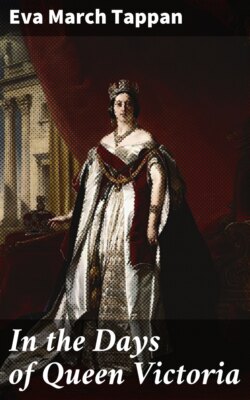Читать книгу In the Days of Queen Victoria - Eva March Tappan - Страница 5
CHAPTER III
ОглавлениеEXAMINATION DAY
When Queen Victoria was a tiny child, she is said to have asked her mother one day, "Mamma, why is it that when Féodore and I are walking all the gentlemen raise their hats to me and not to her?" In 1830, when she was nearly eleven years old, her mother and her teachers thought that it was time for her question to be answered. The King was so ill that everyone knew he could not live many months. The Duke of York had died three years earlier; therefore at the King's death William, Duke of Clarence, would ascend the throne, and Victoria would succeed him.
It seems quite probable that the bright little girl had before this time answered the question for herself. There are stories that if she failed in a lesson a certain teasing boy cousin of hers used to say, "Yes, a pretty queen you will make!" and then he would suggest that when a queen did not rule well her head was likely to be cut off. Another story is that when the child was reading aloud to her mother about the Princess Charlotte, she suddenly looked up from her book and asked, "Mamma, shall I ever be a queen?" Tradition says that the Duchess replied: "It is very possible. I want you to be a good woman, and then you will be a good queen." Whether there is any truth in these stories or not, the child was too observing not to have noticed when very young that she was treated differently from other children, even her sister Féodore. She lived very simply, and Miss Lehzen was always at hand to correct the least approach to a fault; but she could not have failed to see that she was watched wherever she went and that far more attention was paid to her than to her mother. Indeed, she herself said long afterwards that the knowledge of her position came to her gradually and that she "cried much" at the thought of ever having to be a queen.
The little girl kept these thoughts to herself, and even her mother did not know that she was dreading a future on a throne. There are several accounts of just how she was finally told that she would some day wear the crown, but a version which may be trusted comes from Mr. Davys.
"Princess," he said, "to-morrow I wish you to give me a chart of the kings and queens of England."
When morning came, she gave him the chart, and he read it carefully. Then he said:
"It is well done, but it does not go far enough. You have put down 'Uncle King' as reigning, and you have written 'Uncle William' as the heir to the throne, but who should follow him?"
The little girl hesitated, then she said, "I hardly liked to put down myself."
One story of the way the announcement was made to the Princess was written—nearly forty years after the event—by her strict and adoring governess, but it makes her out such a priggish, Pharisaical little moralizer that one cannot help fancying that the devoted woman unconsciously put into the mouth of her idol the speeches that seemed to her appropriate, not to the child, but to the occasion. She says that when the Princess was told of her position, she declared: "Many a child would boast, but they don't know the difficulty. There is much splendor, but there is more responsibility." Then the governess reminded her that if her Aunt Adelaide should have children they would be the ones to ascend the throne. According to this account, the child answered: "If it were so, I should be very glad, for I know by the love Aunt Adelaide bears me how fond she is of children." It seems probable that after the Princess had been told what lay before her, Miss Lehzen made speeches somewhat like these, and that the conscientious, tender-hearted little girl assented to them.
Mr. Davys told the Duchess about the chart, and she wrote at once to the Bishop of London that the Princess now understood her position. The letter ended, "We have everything to hope from this child."
